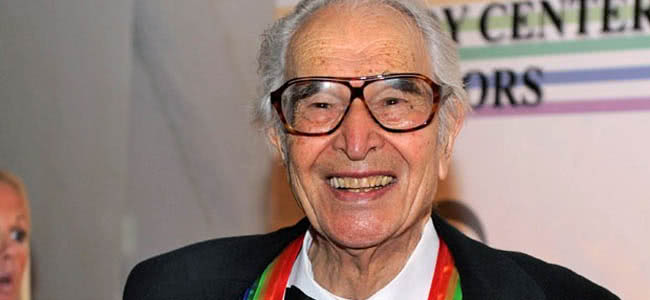Composer, pianist, and all-around jazz icon Dave Brubeck, has died at the age of 91, passing away Wednesday morning of heart failure.
News Ltd reports the jazz musician’s manager, Russel Gloyd confirmed that Brubeck was on his way to a cardiology appointment with his son Darius, when he was stricken, before passing away just one day before his 92nd birthday.
Though he regularly struggled with criticism over his playing technique, Brubeck was one of the genre’s most popular and recognisable figures who composed over 250 works in his time. Best known for his seminal 1959 release with the Dave Brubeck Quartet, Time Out, one of the first multi-million selling records of the genre that influenced a whole generation of artists through to the 60s.
Time Out also featured the legacy-inducing jazz standard ‘Take Five’ – so named for its characteristic 5/4 time signature – which would become the Quartet’s signature tune, and even made the Billboard singles chart in 1961, composed and featuring the talents of Brubeck’s longtime saxophonist, Paul Desmond.
Born in San Francisco on December 6th 1920, Dave Brubeck completed his draft in World War II before returning home to Oakland, Califronia to take up studies at the local Mills College. Brubeck formed an octet, including Desmond on alto sax, playing originals as well as jazz standards, and featured the early experimentation in unusual time signatures that came to signify Brubeck’s career.
Their 1946, self-titled album was a groundbreaking affair, and helped establish Brubeck’s career. Over time, playing local colleges and universites, the octet halved into the Dave Brubeck Quartet and recorded their first album as a four-piece, 1953’s Jazz At Oberlin, live at the Oberlin College.
A year later, and Dave Brubeck graced the cover of TIME magazine – the second major modern jazz musician to do so (following Louis Armstrong in 1949) – and released his first album on Columbia Records, Jazz Goes To College, the same year.
1959 saw the release of Time Out on the same label, who were enthusiastic but concerned about the album of all-original compositions (an unusual practice at the time), many featuring unconventional time signatures – from the opening ‘Blue Rondo à la Turk’ in 9/8, to the off waltz-timing of “Three To Get Ready”. The album quickly went platinum, becoming the first jazz album to sell over a million copies, and led to the legendary 1963 live album, At Carnegie Hall, praised by many critics as the group’s true high watermark.
In 1967 Brubeck disbanded the Quartet to focus on composing music for operas, ballet, and a jazz musical called The Real Amabassadors, a 60s production Brubeck developed with his wife Iola based on their experiences during foreign tours on behalf of the US State Department. In 1976, The Dave Brubeck Quartet reunited for a one-off, 25th Anniversary tour before Brubeck turned his attentions to composing once more.Best known for his seminal 1959 release with the Dave Brubeck Quartet, Time Out, one of the first multi-million selling records of the genre
During the 80s, Brubeck began to write for the screen, contributing music to the eight-part US television special, This Is America, Charlie Brown. A series focusing on American history through the animated exploits of the famous Peanuts character. Brubeck’s music was featured on an episode about NASA, working with three of his sons – the trombone and bass playing Chris, drummer Dan, and his youngest son, cellist Matthew. Brubeck’s eldest child, Darius, is also a noted musician, pianist, producer, educator and performer.
In 2006, Brubeck was recognised by the University of Notre Dame with the Laetare Medal, an annual honour to those “whose genius has enobled the arts and sciences.” Brubeck continued to perform late into his years, and in 2009 – at the age of 88 – while still actively touring, Brubeck was diagnosed with a viral infection that threatened the condition of his heart, before receiving the Kennedy Centre Honours later that year.
By 2011, he was still touring and performing regularly, only a month after getting a pacemaker.
Brubeck is survived by his wife, Iola, his five sons, and one daughter – who all had helped organise a surprise party for the jazz legend for his 92nd birthday, which has since been changed to a tribute gathering to Brubeck in light of his passing.




































